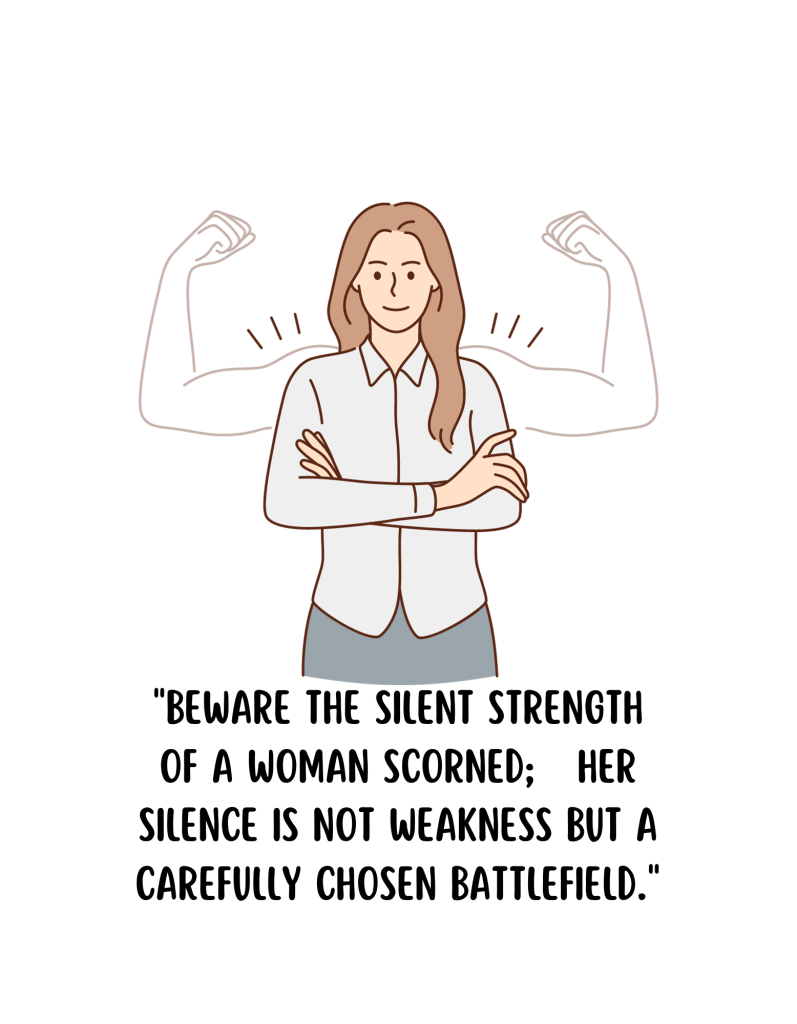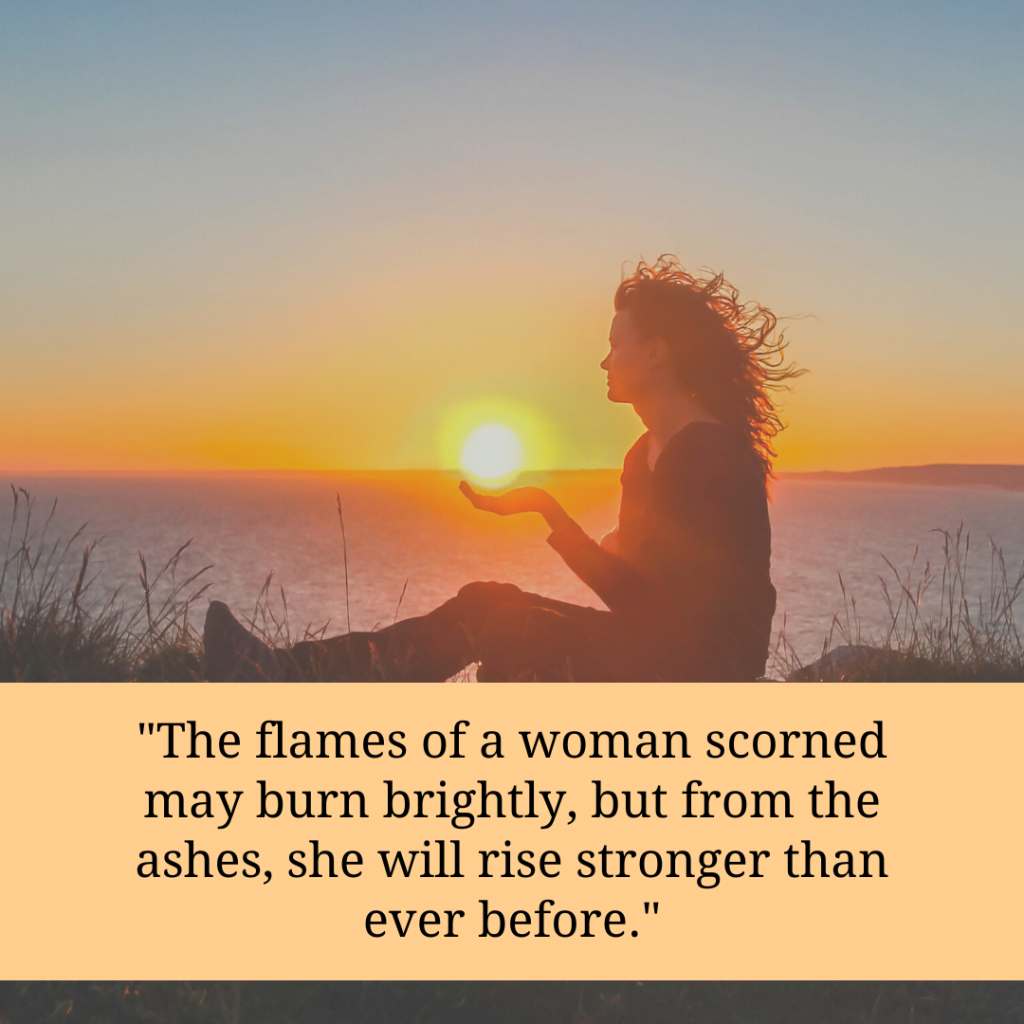Famous Quote Woman Scorned by William Congreve

There is a saying that says, ‘Hell hath no fury like a woman scorned.’ This quote encapsulates the power and intensity of a woman who has been wronged or betrayed in love. It is a reminder that when a woman’s heart is wounded, her anger and vengeance can be indomitable. The term ‘scorned’ implies that the woman in question has experienced deep emotional pain and humiliation, and she will not easily forgive or forget. Whether it be through her wit, determination, or calculated actions, a woman scorned will stop at nothing to seek retribution. This quote sheds light on the resilience and strength that can emerge from heartbreak, presenting a fascinating aspect of human nature and the complexities of love.

Table of Contents
Top 20 Quote Woman Scorned : Revolution of Self-Love and Empowerment





1. “Hell hath no fury like a woman scorned.” – William Congreve
2. “A woman scorned has the power to turn pain into strength, disappointment into resilience, and heartbreak into wisdom.” – Unknown
3. “The fire in a woman scorned’s eyes can ignite a revolution of self-love and empowerment.” – Unknown
4. “A woman scorned knows her worth, and she won’t settle for anything less than the love she deserves.” – Unknown
5. “Do not underestimate the power of a woman scorned. Her vengeance can shake the very foundation of your existence.” – Unknown
6. “The flames of a woman scorned may burn brightly, but from the ashes, she will rise stronger than ever before.” – Unknown
7. “A woman scorned may shed tears in private, but she’ll conquer the world with a smile on her face.” – Unknown
8. “Beware the silent strength of a woman scorned; her silence is not weakness but a carefully chosen battlefield.” – Unknown
9. “A woman scorned is not defined by her heartbreak but by her incredible capacity to heal and love again.” – Unknown
10. “The wounds inflicted by a woman scorned can only be healed through genuine remorse and sincere redemption.” – Unknown
11. “A woman scorned may lose her faith in love, but she will never lose her faith in herself.” – Unknown
12. “The world may try to break her spirit, but a woman scorned will rise, unshakable, like a phoenix from the ashes.” – Unknown
13. “A woman scorned is like a hurricane; you can’t avoid its wrath, but you can choose not to cross its path.” – Unknown
14. “A woman scorned possesses the strength to rebuild her life, love again, and rewrite her own story.” – Unknown
15. “A woman scorned isn’t defined by her pain but by her resilience; she will turn her scars into wings and soar to new heights.” – Unknown
16. “A woman scorned doesn’t seek revenge; she seeks liberation from the chains of betrayal.” – Unknown
17. “Be careful when breaking a woman’s heart, for the fragments may become the building blocks of her vengeance.” – Unknown
18. “A woman scorned may hide her tears, but her thunderous silence will echo through the realms of history.” – Unknown
19. “A woman scorned is like an unsolved mystery; history will forever remember the enigma she remains.” – Unknown
20. “A woman scorned will walk away stronger, wiser, and with a heart guarded by an impenetrable fortress.” – Unknown
The Power of ”Hell Hath No Fury Like a Woman Scorned”: Unraveling the Meaning Behind the Quote

Have you ever heard the phrase “Hell hath no fury like a woman scorned”? This powerful quote has resonated throughout history and popular culture, captivating the imagination of many. But what exactly does it mean and why does it pack such a punch? Join me as we dive deeper into the meaning behind this famous quote and uncover its timeless significance.
What does it mean to be “scorned”?
Scorn can be defined as a feeling of contempt or disdain directed towards someone who has wronged you or betrayed your trust. When a person feels scorned, their emotions can range from anger and bitterness to resentment and vengefulness. It is a deep wound inflicted upon one’s soul, often leaving an indelible mark on their psyche.
The fury unleashed: Understanding the metaphor
When we say “Hell hath no fury like a woman scorned,” we use a metaphorical expression to capture the intensity of emotions that can be unleashed within a person, particularly a woman, when she feels betrayed, hurt, or deceived. The phrase suggests that the wrath of a scorned woman is so ferocious that it can match or even surpass the horrors of hell itself. It speaks to the profound power and strength hidden within those who have been wronged.
Historical origins and cultural influence
The origins of this quote can be traced back to the play “The Mourning Bride” by William Congreve, written in 1697. The exact line reads, “Heaven has no rage like love to hatred turned, Nor hell a fury like a woman scorned.” From its theatrical beginnings, this quote has embedded itself into the fabric of human storytelling, inspiring countless adaptations and references in literature, movies, and songs.
Throughout history, women have often been portrayed as delicate and submissive, expected to suppress their anger and display only gentleness and grace. However, the quote challenges this notion, highlighting the immense strength and resilience women possess when pushed beyond their limits. It calls attention to the undeniable force that lies within the human spirit, regardless of gender.
Relevance in the modern world
While the quote may have origins in a time long past, its resonance in today’s society is undeniable. We live in a world where cries for justice and equality reverberate through social movements and advocacy. This quote serves as a reminder that despite the struggles and challenges faced by women, their voices and power cannot be silenced.
Moreover, the quote invites us to reflect on the consequences of actions that lead to feelings of scorn or betrayal. It warns against underestimating the resilience and determination of those who have been wronged, emphasizing the importance of treating one another with respect, compassion, and fairness.
You can also read Classy Women Quotes
Conclusion
The quote “Hell hath no fury like a woman scorned” captures the fiery and unstoppable force that lies dormant within someone who has experienced deep hurt or betrayal. It carries a cautionary message to acknowledge and respect the emotions of others, while also serving as a powerful testament to the indomitable strength of the human spirit. So let us remember the power and complexity of the emotions hidden within each one of us, and strive to create a world where empathy and understanding prevail.
Frequently Asked Questions about the Quote “Hell hath no fury like a woman scorned”

1. What does the quote “Hell hath no fury like a woman scorned” mean?
The quote “Hell hath no fury like a woman scorned” is a cautionary statement that highlights the intense anger and revengeful behavior that can result from a woman feeling betrayed or rejected by someone she loved or trusted.
2. Where does the quote “Hell hath no fury like a woman scorned” originate from?
The quote “Hell hath no fury like a woman scorned” is from the play “The Mourning Bride” written by William Congreve in 1697. The line is spoken by the character Zara and has gained significant recognition over the years.
3. Can only women be scorned or experience fury?
No, the quote “Hell hath no fury like a woman scorned” uses a gender-specific language but the underlying concept applies to all individuals. Both men and women can feel scorned or experience intense anger when they perceive betrayal or rejection.
4. Is the quote “Hell hath no fury like a woman scorned” still relevant today?
Yes, the quote remains relevant as it reflects a deep-seated human emotion and can be applied in various contexts. Though originally focused on women, it is important to note that any individual, regardless of gender, can experience intense anger or seek revenge when they feel scorned.
5. What is the significance of the quote “Hell hath no fury like a woman scorned” in popular culture?
The quote has made its way into popular culture, being referenced in literature, films, music, and everyday conversations. It has become an idiom used to warn against underestimating or mistreating someone, particularly a woman, who has been wronged.

0 Comments